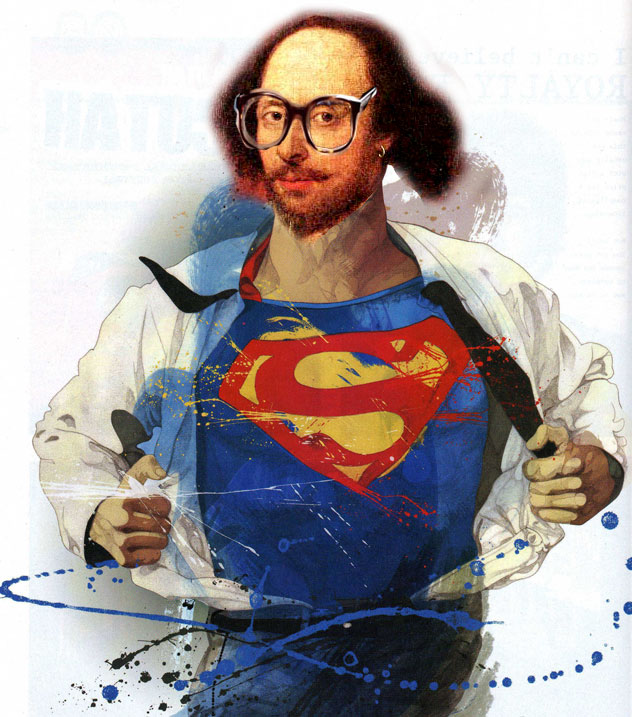 I remembered interview with comics write.artist John Byrne in the late 1980s in which he described his revamp of the Superman character for DC comics. He said the one of the things that mystified him as a kid was that everybody was trying to figure out who Superman really was. His question, which had never seemed to occur to previous comics writers, was very simple:
I remembered interview with comics write.artist John Byrne in the late 1980s in which he described his revamp of the Superman character for DC comics. He said the one of the things that mystified him as a kid was that everybody was trying to figure out who Superman really was. His question, which had never seemed to occur to previous comics writers, was very simple:
When did Superman announce that he had a secret identity?
Asking who Batman is, for instance, makes sense. The guy wears a mask. It’s only natural to wonder who’s face is behind it. Superman, however, doesn’t wear a mask. But the conventions of super heroism presume that every superhero has a mild-mannered alter ego, so Lois Lane spends all of her time trying to prove Clark is Supes. But, if you think about it, there’s no reason to suspect that he is anybody other than the guy flying around in blue tights and yellow undies. There’s no reason at all to think that he puts on a pair of glasses and pretends to be a mild-mannered reporter for a major metropolitan newspaper.
That, actually, is the only way Superman’s Clark Kent disguise makes even a lick of sense. (Not a lot of sense, mind you, but a lick.) After all, people aren’t looking for Superman’s disguise, so it wouldn’t occur to anybody that Superman and Clark Kent are the same guy, even if they look alike.
That same premise is the central problem in the authorship controversy surrounding Shakespeare. People keep asking variations of the following question:
“How could Edward de Vere have pretended he was William Shakespeare without anyone noticing?”
That question presupposes two things, neither of which are true:
1. That William Shaksper of Stratford on Avon was a prominent public figure that contemporaries would have connected to Shakespeare’s plays during his lifetime.
2. That use of a pseudonym would have aroused suspicion and required a live body to take credit for the works written with the fake moniker.
I can demonstrate that both these contentions are false by turning to unlikely sources: namely, the traditional, orthodox Stratfordian biographers who insist that, in Elizabethan England, nobody paid attention to playwrights. Therefore, saith the conventional wisdom, Shakespeare would have toiled in relative obscurity, so we shouldn’t be surprised that there are no letters addressed to him, no information about his doings or his whereabouts, and, indeed, no direct mentions of him that connect him to any literary enterprise.
But the fact is that Shakespeare’s contemporaries – Ben Johnson, Edmund Spenser, John Lyly – did leave behind letters and things that showed they were real people living in the real world. Shakespeare didn’t. Sure, Mr. Shaxper of Stratford left behind some mundane legal detritus that showed he was alive, but none of it connects him to the writings of Shakespeare, and most of it contradicts what we know about the poet and playwright.
My theory, then, is that no one considered William Shakespeare, the poet and playwright, to be William Shaksper of Stratford, a similarly-named actor and grain merchant. That connection wasn’t made until after both men were long dead. While both men were alive, everyone thought they were two different people, which is why nobody bothered to “expose” Shakespeare’s real identity. Nobody reveals the big secret because nobody thinks there’s a big secret to reveal. That’s why records listing prominent playwrights sometimes mention Oxford and not Shakespeare, and vice versa. It simply didn’t occur to them that they were keeping a secret, or that anyone in the future would mistake the one man for the other.
In addition, playwright Shakespeare wouldn’t have had to have someone take credit for him, because there would have been no reason for him to make a personal appearance at any occasion. Elizabethan England was decidedly pre-Oprah – authors didn’t do book tours or show up on The Tonight Show. Stratfordian scholars make this point over and over again – it was the actors who were feted and adored, not the writers. In addition, Shakespeare, during his lifetime, was primarily known as a poet, the author of Venus and Adonis and The Rape of Lucrece. By comparison, his work as a playwright gets little mention in the records of the day. Adoration of authors for the theater didn’t really begin until Shakespeare’s First Folio was published in 1623 – again, after both Shakespeare and Shaksper were dead.
So the answer to the question – how did de Vere get away with impersonating the guy from Stratford? – is that he didn’t, and nobody thought that he did. If you doubt that this is possible, then show me the shocking exposé in which Mark Twain is “revealed” to be Samuel Clemens. You won’t find one.
Of course, that’s because Twain wore glasses when he wasn’t being a superwriter.
Hello! Just wondering if I can get permission to use your fabulous Super Shakespeare photo?